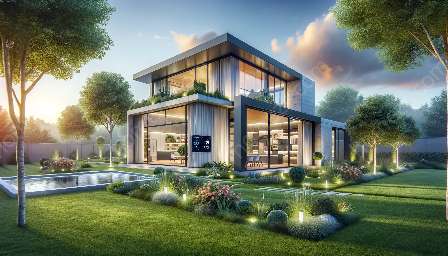Modern homeowners are increasingly turning to home automation and sustainable living to enhance their living spaces while reducing their environmental impact. The integration of home technologies and sustainable living practices provides numerous benefits, from convenience and efficiency to cost savings and environmental stewardship.
Home Automation: The Future of Smart Living
Home automation, also known as smart home technology, refers to the use of interconnected devices and systems that automate and control various aspects of a home. These technologies are designed to simplify and streamline daily routines, improve energy efficiency, and enhance overall comfort and convenience.
One of the primary goals of home automation is to create a more efficient and responsive living environment. This can be achieved through the use of smart thermostats, lighting controls, home security systems, and voice-activated assistants. With the ability to monitor and adjust these systems remotely, homeowners can enjoy greater control over their living spaces, regardless of their physical location.
How Home Technologies Support Sustainable Living
Integrating home automation with sustainable living practices offers the opportunity to create an eco-friendly and technologically advanced home. By harnessing the power of home technologies, homeowners can significantly reduce their environmental footprint while enjoying the benefits of a modern and efficient living space.
Energy Efficiency and Conservation
Home automation systems play a pivotal role in promoting energy efficiency and conservation. Smart thermostats, for example, can intelligently regulate heating and cooling systems to optimize energy usage based on the homeowners' preferences and daily routines. This not only reduces energy consumption but also leads to lower utility bills and a decreased environmental impact.
Similarly, smart lighting solutions enable homeowners to control and automate the usage of lights, reducing unnecessary energy waste. By integrating sensors, timers, and dimmers, these systems contribute to a more sustainable and cost-effective approach to lighting control.
Water Management and Conservation
Home automation extends to water management as well, with the introduction of smart irrigation systems and leak detection devices. These technologies help homeowners monitor and regulate water usage, minimizing waste and promoting conservation.
Waste Reduction and Recycling
Advanced home technologies can facilitate waste reduction and recycling efforts. Smart waste management systems provide real-time monitoring and sorting capabilities, making recycling and composting more accessible and efficient. Additionally, smart appliances and devices are designed to minimize resource consumption and optimize waste management within the home environment.
Sustainable Living: Embracing Environmental Responsibility
At its core, sustainable living involves adopting lifestyle choices and practices that prioritize environmental responsibility, resource conservation, and long-term ecological harmony. From sustainable materials and energy-efficient designs to mindful consumption and waste reduction, sustainable living encompasses a broad spectrum of principles and strategies.
Implementing Sustainable Practices at Home
When striving for sustainable living, homeowners can take numerous steps to create an eco-friendly and socially responsible living environment. This includes:
- Utilizing renewable energy sources, such as solar panels and wind turbines
- Incorporating energy-efficient appliances and systems
- Opting for eco-friendly building materials and construction methods
- Reducing overall energy consumption through insulation and efficient building design
- Adopting water-saving fixtures and appliances
- Promoting waste reduction, recycling, and composting practices
By integrating these sustainable practices into their homes, homeowners not only contribute to environmental preservation but also reap the benefits of reduced utility costs and enhanced comfort within their living spaces.
Advancing Sustainability Through Technology
With the emergence of innovative home technologies, the pursuit of sustainability has been elevated to new heights. The pairing of sustainable living practices with cutting-edge home automation systems enables homeowners to maximize their environmental impact while enjoying the convenience and comfort that modern technology affords.
By leveraging the power of data analytics, automation, and remote monitoring, homeowners can gain valuable insights into their energy usage patterns, water consumption, and overall environmental footprint. This information empowers them to make informed decisions and adjustments that support sustainability goals and environmental stewardship.
The Synergy of Home Automation and Sustainable Living
When home automation and sustainable living converge, a harmonious synergy is formed, resulting in a living environment that is both smart and eco-conscious. This union of technological innovation and environmental mindfulness yields several compelling benefits:
Enhanced Comfort and Convenience
Home automation enriches the living experience by providing unparalleled convenience and comfort. From automated climate control and lighting presets to voice-activated commands and personalized settings, homeowners can effortlessly tailor their living spaces to suit their preferences and lifestyle.
Cost Savings and Efficiency
The integration of sustainable practices and home technologies leads to significant cost savings and operational efficiency. By optimizing energy usage, water consumption, and waste management, homeowners can enjoy reduced utility bills and a longer lifespan for their home systems and appliances.
Environmental Preservation and Impact Reduction
By embracing sustainable living principles and utilizing smart home technologies, homeowners actively contribute to environmental preservation and reducing their carbon footprint. From minimized energy waste to conscientious water usage and waste management, every aspect of the home evolves to reflect a commitment to environmental responsibility.
Future-Proofing and Long-Term Sustainability
Investing in home automation and sustainable living solutions provides a foundation for future-proofing one's home. By incorporating advanced technologies and sustainable practices, homeowners are better equipped to adapt to evolving environmental regulations and technological advancements, ensuring the long-term sustainability of their living spaces.
Embracing Home Automation and Sustainable Living
For homeowners seeking to embrace the fusion of home automation and sustainable living, the journey begins with an understanding of available technologies and sustainable living strategies. By incorporating intelligent home systems, energy-efficient appliances, and sustainable design principles, individuals can transform their houses into eco-friendly and technologically advanced homes.
Envision a home where automated climate control adjusts seamlessly to your preferences, smart lighting adapts to your daily routines, and energy usage is optimized through intelligent systems. Picture a living space that reflects environmental conscientiousness, vibrant efficiency, and modernity.


